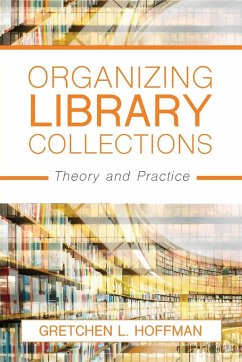Hoffman, Gretchen L., associate professor, School of Library and Inf
Organizing Library Collections
Theory and Practice
Hoffman, Gretchen L., associate professor, School of Library and Inf
Organizing Library Collections
Theory and Practice
- Broschiertes Buch
- Merkliste
- Auf die Merkliste
- Bewerten Bewerten
- Teilen
- Produkt teilen
- Produkterinnerung
- Produkterinnerung
Written for beginning library science students, this book introduces the theory and practice of organizing library collections in a clear, straightforward, and understandable way. It explains why and how libraries organize their collections, and how theory and practice work together to help library users.
Andere Kunden interessierten sich auch für
![Practical Guide to Dewey Decimal Classification Practical Guide to Dewey Decimal Classification]() Karen SnowPractical Guide to Dewey Decimal Classification32,99 €
Karen SnowPractical Guide to Dewey Decimal Classification32,99 €![Cataloging and Classification Cataloging and Classification]() Athena SalabaCataloging and Classification100,99 €
Athena SalabaCataloging and Classification100,99 €![Cataloging Library Resources Cataloging Library Resources]() Marie Keen ShawCataloging Library Resources47,99 €
Marie Keen ShawCataloging Library Resources47,99 €![Supply Chain Management for Collection Services of Academic Libraries Supply Chain Management for Collection Services of Academic Libraries]() John WangSupply Chain Management for Collection Services of Academic Libraries64,99 €
John WangSupply Chain Management for Collection Services of Academic Libraries64,99 €![Cataloging and Classification Cataloging and Classification]() Cataloging and Classification43,99 €
Cataloging and Classification43,99 €![A Classification for Medical and Veterinary Libraries A Classification for Medical and Veterinary Libraries]() Cyril C BarnardA Classification for Medical and Veterinary Libraries25,99 €
Cyril C BarnardA Classification for Medical and Veterinary Libraries25,99 €![Cataloging and Classification Cataloging and Classification]() Cataloging and Classification154,99 €
Cataloging and Classification154,99 €-
-
-
Written for beginning library science students, this book introduces the theory and practice of organizing library collections in a clear, straightforward, and understandable way. It explains why and how libraries organize their collections, and how theory and practice work together to help library users.
Produktdetails
- Produktdetails
- Verlag: Rowman & Littlefield
- Seitenzahl: 394
- Erscheinungstermin: 7. August 2019
- Englisch
- Abmessung: 229mm x 152mm x 21mm
- Gewicht: 576g
- ISBN-13: 9781538108512
- ISBN-10: 1538108518
- Artikelnr.: 55507599
- Herstellerkennzeichnung
- Libri GmbH
- Europaallee 1
- 36244 Bad Hersfeld
- gpsr@libri.de
- Verlag: Rowman & Littlefield
- Seitenzahl: 394
- Erscheinungstermin: 7. August 2019
- Englisch
- Abmessung: 229mm x 152mm x 21mm
- Gewicht: 576g
- ISBN-13: 9781538108512
- ISBN-10: 1538108518
- Artikelnr.: 55507599
- Herstellerkennzeichnung
- Libri GmbH
- Europaallee 1
- 36244 Bad Hersfeld
- gpsr@libri.de
Gretchen Hoffman is an Associate Professor in the School of Library and Information Studies at Texas Woman's University. She has been teaching there since 2007. Her teaching and research agenda centers on the organization of information, specifically library cataloging. Courses she teaches include Cataloging and Classification, Advanced Cataloging and Classification, Collection Development, and Information Organization. Before moving to Texas Woman's University, Hoffman was a professional cataloger at the University of Kansas, specializing in complex and difficult cataloging, music cataloging (scores and audio recordings), and cataloging German-language monographs. Prior to that, she worked as a professional serials cataloger at Portland State University, specializing in federal government documents.
Part I: Theory of Organizing Library Collections
1: Purpose and History of Organizing Library Collections
Library Collections
How Library Collections are Organized: Theory
How Library Collections are Organized: Practice
Factors That Influence Organization in Libraries
Limits to Organizing Library Collections
History of Organizing Library Collections
2: Metadata and Encoding: Fundamental to Organizing Library Collections
Metadata
Types of Metadata
Purpose of Metadata
Metadata Standards
Metadata Created in Libraries
Encoding Standards and Markup Languages
Encoding Standards in Libraries: MARC
Encoding Standards in Libraries: Digital Collections
3: Describing and Providing Access to Library Collections
Descriptive Metadata and its Purpose
Descriptive Metadata in Libraries: Descriptive Cataloging
Resource Description and Access (RDA)
Other Content Standards
Metadata Schemas Used in Libraries
4: Providing Subject Access to Library Collections
Subject Analysis
Controlled Vocabularies
Uncontrolled Vocabularies
Controlled Vocabularies Used in Libraries
Library of Congress Subject Headings
Children's Subject Headings
Library of Congress Genre/Form Terms (LCGFT)
Sears List of Subject Headings
Medical Subject Headings (MeSH)
Faceted Application of Subject Terminology (FAST)
Other Controlled Vocabularies
5: Classifying Library Collections
Classification
Library Classification
Library Classification: Construction Issues
Library Classification: Application Issues
Arranging Library Collections
Classification Schemes Used in Libraries
Dewey Decimal Classification
Library of Congress Classification
National Library of Medicine Classification
Superintendent of Documents Classification
Other Library Classification Schemes
Alternative Library Classification
Part II: Practice of Organizing Library Collections
6: Organizing Library Collections: Standards and Policy Development
Standardization
The System of Standards
Standards and Policy Development at the International Level
Standards and Policy Development at the National Level
Standards and Policy Development at the State and Regional Level
Cataloging Policy Development at the Local Level
7: How Libraries Organize Their Collections
Cataloging Practice
Monographs, Serials, and Electronic Resources
Organizing Books
Organizing Serials
Organizing Media and Other Formats
Government Publications
Metadata Practice
Issues in Cataloging and Metadata Practice
8: Organizing Collections in Academic, Public, School, and Special
Libraries
Similarities and Differences Among Libraries
Academic Libraries
Public Libraries
School Libraries
Special Libraries
9: Ethical Issues in Organizing Library Collections
Neutrality and Power
Ethics and Values Statements
The Role of the User
Less Customization
Bias and Marginalization in Subject Standards
Ethical Obligations of Catalogers and Metadata Specialists
10: Current Developments in Organizing Library Collections
Linked Open Data
Linked Data in Libraries
Identity Management
Electronic Resources
Metadata Work
Discovery Products
1: Purpose and History of Organizing Library Collections
Library Collections
How Library Collections are Organized: Theory
How Library Collections are Organized: Practice
Factors That Influence Organization in Libraries
Limits to Organizing Library Collections
History of Organizing Library Collections
2: Metadata and Encoding: Fundamental to Organizing Library Collections
Metadata
Types of Metadata
Purpose of Metadata
Metadata Standards
Metadata Created in Libraries
Encoding Standards and Markup Languages
Encoding Standards in Libraries: MARC
Encoding Standards in Libraries: Digital Collections
3: Describing and Providing Access to Library Collections
Descriptive Metadata and its Purpose
Descriptive Metadata in Libraries: Descriptive Cataloging
Resource Description and Access (RDA)
Other Content Standards
Metadata Schemas Used in Libraries
4: Providing Subject Access to Library Collections
Subject Analysis
Controlled Vocabularies
Uncontrolled Vocabularies
Controlled Vocabularies Used in Libraries
Library of Congress Subject Headings
Children's Subject Headings
Library of Congress Genre/Form Terms (LCGFT)
Sears List of Subject Headings
Medical Subject Headings (MeSH)
Faceted Application of Subject Terminology (FAST)
Other Controlled Vocabularies
5: Classifying Library Collections
Classification
Library Classification
Library Classification: Construction Issues
Library Classification: Application Issues
Arranging Library Collections
Classification Schemes Used in Libraries
Dewey Decimal Classification
Library of Congress Classification
National Library of Medicine Classification
Superintendent of Documents Classification
Other Library Classification Schemes
Alternative Library Classification
Part II: Practice of Organizing Library Collections
6: Organizing Library Collections: Standards and Policy Development
Standardization
The System of Standards
Standards and Policy Development at the International Level
Standards and Policy Development at the National Level
Standards and Policy Development at the State and Regional Level
Cataloging Policy Development at the Local Level
7: How Libraries Organize Their Collections
Cataloging Practice
Monographs, Serials, and Electronic Resources
Organizing Books
Organizing Serials
Organizing Media and Other Formats
Government Publications
Metadata Practice
Issues in Cataloging and Metadata Practice
8: Organizing Collections in Academic, Public, School, and Special
Libraries
Similarities and Differences Among Libraries
Academic Libraries
Public Libraries
School Libraries
Special Libraries
9: Ethical Issues in Organizing Library Collections
Neutrality and Power
Ethics and Values Statements
The Role of the User
Less Customization
Bias and Marginalization in Subject Standards
Ethical Obligations of Catalogers and Metadata Specialists
10: Current Developments in Organizing Library Collections
Linked Open Data
Linked Data in Libraries
Identity Management
Electronic Resources
Metadata Work
Discovery Products
Part I: Theory of Organizing Library Collections
1: Purpose and History of Organizing Library Collections
Library Collections
How Library Collections are Organized: Theory
How Library Collections are Organized: Practice
Factors That Influence Organization in Libraries
Limits to Organizing Library Collections
History of Organizing Library Collections
2: Metadata and Encoding: Fundamental to Organizing Library Collections
Metadata
Types of Metadata
Purpose of Metadata
Metadata Standards
Metadata Created in Libraries
Encoding Standards and Markup Languages
Encoding Standards in Libraries: MARC
Encoding Standards in Libraries: Digital Collections
3: Describing and Providing Access to Library Collections
Descriptive Metadata and its Purpose
Descriptive Metadata in Libraries: Descriptive Cataloging
Resource Description and Access (RDA)
Other Content Standards
Metadata Schemas Used in Libraries
4: Providing Subject Access to Library Collections
Subject Analysis
Controlled Vocabularies
Uncontrolled Vocabularies
Controlled Vocabularies Used in Libraries
Library of Congress Subject Headings
Children's Subject Headings
Library of Congress Genre/Form Terms (LCGFT)
Sears List of Subject Headings
Medical Subject Headings (MeSH)
Faceted Application of Subject Terminology (FAST)
Other Controlled Vocabularies
5: Classifying Library Collections
Classification
Library Classification
Library Classification: Construction Issues
Library Classification: Application Issues
Arranging Library Collections
Classification Schemes Used in Libraries
Dewey Decimal Classification
Library of Congress Classification
National Library of Medicine Classification
Superintendent of Documents Classification
Other Library Classification Schemes
Alternative Library Classification
Part II: Practice of Organizing Library Collections
6: Organizing Library Collections: Standards and Policy Development
Standardization
The System of Standards
Standards and Policy Development at the International Level
Standards and Policy Development at the National Level
Standards and Policy Development at the State and Regional Level
Cataloging Policy Development at the Local Level
7: How Libraries Organize Their Collections
Cataloging Practice
Monographs, Serials, and Electronic Resources
Organizing Books
Organizing Serials
Organizing Media and Other Formats
Government Publications
Metadata Practice
Issues in Cataloging and Metadata Practice
8: Organizing Collections in Academic, Public, School, and Special
Libraries
Similarities and Differences Among Libraries
Academic Libraries
Public Libraries
School Libraries
Special Libraries
9: Ethical Issues in Organizing Library Collections
Neutrality and Power
Ethics and Values Statements
The Role of the User
Less Customization
Bias and Marginalization in Subject Standards
Ethical Obligations of Catalogers and Metadata Specialists
10: Current Developments in Organizing Library Collections
Linked Open Data
Linked Data in Libraries
Identity Management
Electronic Resources
Metadata Work
Discovery Products
1: Purpose and History of Organizing Library Collections
Library Collections
How Library Collections are Organized: Theory
How Library Collections are Organized: Practice
Factors That Influence Organization in Libraries
Limits to Organizing Library Collections
History of Organizing Library Collections
2: Metadata and Encoding: Fundamental to Organizing Library Collections
Metadata
Types of Metadata
Purpose of Metadata
Metadata Standards
Metadata Created in Libraries
Encoding Standards and Markup Languages
Encoding Standards in Libraries: MARC
Encoding Standards in Libraries: Digital Collections
3: Describing and Providing Access to Library Collections
Descriptive Metadata and its Purpose
Descriptive Metadata in Libraries: Descriptive Cataloging
Resource Description and Access (RDA)
Other Content Standards
Metadata Schemas Used in Libraries
4: Providing Subject Access to Library Collections
Subject Analysis
Controlled Vocabularies
Uncontrolled Vocabularies
Controlled Vocabularies Used in Libraries
Library of Congress Subject Headings
Children's Subject Headings
Library of Congress Genre/Form Terms (LCGFT)
Sears List of Subject Headings
Medical Subject Headings (MeSH)
Faceted Application of Subject Terminology (FAST)
Other Controlled Vocabularies
5: Classifying Library Collections
Classification
Library Classification
Library Classification: Construction Issues
Library Classification: Application Issues
Arranging Library Collections
Classification Schemes Used in Libraries
Dewey Decimal Classification
Library of Congress Classification
National Library of Medicine Classification
Superintendent of Documents Classification
Other Library Classification Schemes
Alternative Library Classification
Part II: Practice of Organizing Library Collections
6: Organizing Library Collections: Standards and Policy Development
Standardization
The System of Standards
Standards and Policy Development at the International Level
Standards and Policy Development at the National Level
Standards and Policy Development at the State and Regional Level
Cataloging Policy Development at the Local Level
7: How Libraries Organize Their Collections
Cataloging Practice
Monographs, Serials, and Electronic Resources
Organizing Books
Organizing Serials
Organizing Media and Other Formats
Government Publications
Metadata Practice
Issues in Cataloging and Metadata Practice
8: Organizing Collections in Academic, Public, School, and Special
Libraries
Similarities and Differences Among Libraries
Academic Libraries
Public Libraries
School Libraries
Special Libraries
9: Ethical Issues in Organizing Library Collections
Neutrality and Power
Ethics and Values Statements
The Role of the User
Less Customization
Bias and Marginalization in Subject Standards
Ethical Obligations of Catalogers and Metadata Specialists
10: Current Developments in Organizing Library Collections
Linked Open Data
Linked Data in Libraries
Identity Management
Electronic Resources
Metadata Work
Discovery Products









